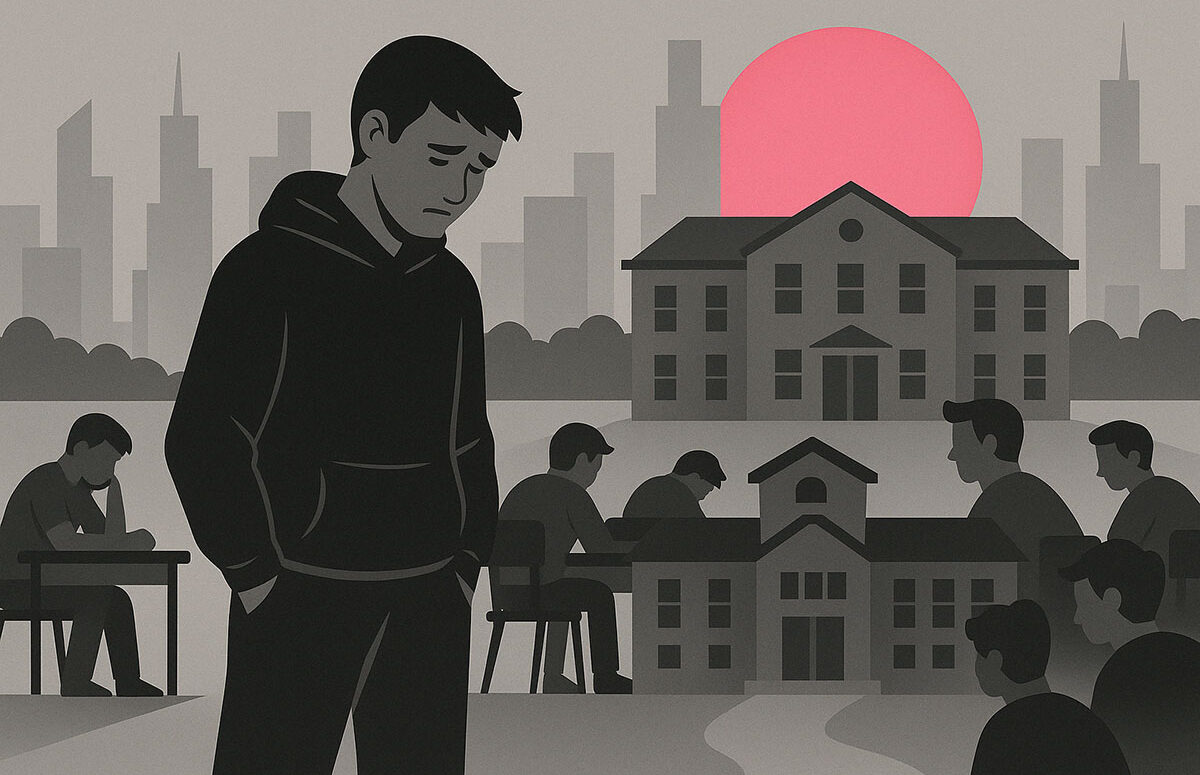The Education System Is Failing Our Young Men
We are watching a generation of boys disengage from school while society and leadership look the other way. From the first days of primary school to the final exam hall of sixth form, boys are underperforming, overlooked and often written off. The system isn’t broken – it’s rigged. It’s bullshit, and everyone knows it. Their decline is measurable, undeniable, and scandalously ignored. While politicians talk smack about ‘levelling up’, the data tells a different story: boys are slipping further behind and barely anyone seems to give a shit.
Problemn
This post draws heavily on the findings of the Centre for Social Justice’s 2025 report Lost Boys, which provides a comprehensive overview of the growing crisis facing young men in Britain. You can read the full report here: https://www.centreforsocialjustice.org.uk/library/lost-boys
Boys are being failed by our schools. At every stage – EYFS, KS1-3, GCSE, A-Level – they lag behind girls. According to Lost Boys, only 60% of boys are deemed ‘school ready’ at five, compared to 75% of girls. At GCSE, boys average half a grade lower in every subject. At A-level, they trail girls by a grade and a half across their best three subjects. Fewer boys go to university. Boys are twice as likely to be excluded. Worse still, some boys report being taught that they are ‘a problem for society’. This is not inclusion. It’s systemic failure wearing a progressive mask.
Causes
There are multiple causes, most of them systemic and long-standing. An obsession with standardised testing rewards early developers and rule-followers, leaving behind boys who mature later or learn differently. It’s hard to acknowledge but the feminisation of education – in curriculum, staffing and behaviour management – means that fewer boys see themselves reflected in their learning environment. Reading for pleasure is collapsing, especially among boys, who prefer smartphones or video games to books because dopamine always wins. This isn’t a sign of moral weakness; it’s behavioural economics. As Jonah Berger and Dan Ariely have both demonstrated, human behaviour is shaped more by environment than by character. When schools ignore this, boys pay the price.
And then there’s the uncomfortable truth nobody in education seems willing to face. While schools hand out paper worksheets and pretend it’s still fucking 1940, boys are living in algorithmic echo chambers curated by YouTube, TikTok and Instagram. Andrew Tate isn’t a fluke – he’s a feature, not a bug, of a system that rewards outrage, misogyny and manufactured masculinity. These platforms aren’t just feeding boys content; they are weaponising boredom, anger and alienation.
Marianna Spring’s BBC investigations and her book Among the Trolls expose this clearly: boys are being groomed, not by shadowy predators in vans, but by multimillion-dollar tech platforms whose business model is built on keeping boys angry, addicted and distracted. They are pulled into pipelines of conspiracy, grievance and anti-education rhetoric by algorithms that know them better than their teachers do.
Jaron Lanier has long warned about the psychological effects of algorithmic manipulation. In Ten Arguments for Deleting Your Social Media Accounts Right Now, he shows how these systems distort perception, reinforce polarisation, and rewire behaviour — not metaphorically, but neurologically. Boys aren’t just watching this stuff. It’s being engineered to shape who they become. The content is designed to radicalise by degrees: what starts as fitness advice or video game walkthroughs morphs into misogyny, nihilism, and conspiracy. They don’t fall into these pipelines — they’re pushed.
Even public figures like Gareth Southgate are starting to ring the alarm. In a recent lecture, he questioned what kind of society we’re building if boys and young men have no one guiding them offline, no values reinforced at home or in school, and only the algorithm as a mentor. When our national football manager is making more sense about youth development than most educational policy makers, you know something’s fucked.
This is the context boys are growing up in. And the silence from those in charge? Deafening.
Effects
The effects are devastating. Boys fall behind, tune out and drop out. Poor literacy correlates with poor life chances: half of all prisoners are functionally illiterate, and the prison population is 96% male. When boys don’t read, they don’t write. When they don’t write, they don’t pass. When they don’t pass, they don’t progress. This isn’t a slippery slope – it’s a cliff edge.
Meanwhile, the psychological damage mounts. Boys who fail are more likely to become NEET, more likely to suffer from mental health issues, and more likely to see themselves as surplus to society. As Steven Pinker has noted, we ignore cognitive and emotional sex differences at our peril. We’re raising a generation of young men who don’t see the point. And who can blame them?
Solutions
We need to start with honesty. Acknowledge that boys are struggling and act.
First, schools must radically rethink engagement. That means competition, movement, and purpose—not endless passive compliance. Bring in hands-on, practical work across all subjects. Expand vocational options without treating them like second-class paths. Make learning feel useful, not ornamental.
Second, we must counter the algorithm. Digital literacy must become a foundational part of the curriculum—not a side note, but a core skill. Teach boys how content finds them, how platforms manipulate their attention, and how to spot ideological bait dressed up as empowerment. Use the work of Jaron Lanier, Spring, and others to develop real critical resilience, not just token internet safety tick-boxing. If algorithms are shaping character, schools must help boys reclaim their agency.
Third, bring men back into schools. Train, recruit and retain male teachers, mentors, and pastoral leaders—not to enforce discipline, but to model purpose, presence and emotional literacy. Boys need to see good men in positions of guidance, not just judgment.
Fourth, stop treating masculinity like a diagnosis. We need a shift in school culture that stops demonising boys for being boys and starts supporting them for becoming men. If Gareth Southgate can give a better lecture on mentorship than most PSHE departments, maybe it’s time we gave our boys something better than one-hour assemblies and an online worksheet on resilience.
Fifth, break the assessment stranglehold. The current system rewards perfectionism, early verbal fluency and quiet compliance—traits statistically more common in girls. We need broader forms of assessment that value creativity, problem-solving, leadership and effort.
And finally: Every school should have a boys’ strategy—not a PR exercise, but a commitment to serious, sustained change backed by data, training and accountability.
As Steven Johnson wrote, real innovation comes from looking sideways, not from doubling down on what doesn’t work. Stop pretending the current system just needs tweaks. It needs reimagining.
Conclusion
This isn’t about nostalgia or pitting boys against girls. It’s about recognising that boys are being failed by a system that never bothered to meet them where they are. We have the data. We have the insight. What we lack is the fucking courage; No one in education is even talking about Tate or Trump.
Don’t let our boys become the collateral damage of a system too scared to admit it has a problem.

